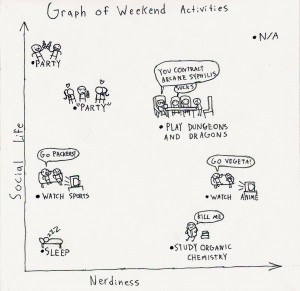Category: Opinion
Also, see Soapbox
Comic 10/4/2012
As culturally correct as can be
By Rachel Vinciguerra
Transcript Reporter
“Aloha” means hello AND goodbye. Hula is the native dance. And in every movie I’ve ever seen about it there’s an ukulele. That was the extent of my knowledge about Hawaii before I proposed a TiPiT to go there. Maybe it was the early 20th century American ties that drew me in, or the exotic Polynesian food and dance, but I came away with a much fuller understanding of the people, the history and the culture than I could have hoped for when I arrived.
For two and a half weeks I trekked around the island of Oahu bugging people with my questions– and I had a lot. What is the significance of a lei? Why is hula taken so much less seriously on the mainland? How was the monarchy overthrown? What is your responsibility to present Hawaiian culture? Why does everyone holding a campaign sign keep waving at me? The last, I found out, is because of a superstition that if lobbyers do not wave at passerbys their candidate will lose. That’s one mystery solved.
I went any place I could get a tour or the time for an interview, from the state-run Bishop Museum, to the Mormon-owned, Disney World of Hawaiian culture, the Polynesian Cultural Center (PCC). The PCC is laid out like EPCOT, with different countries represented around a central lagoon. Each derivative Hawaiian culture has thatched houses, relevant activities and representatives to cook the foods, teach the dances and demonstrate their way of life.
I clicked on my audio recorder and began asking questions. Cy Bridges, the Cultural Director of the PCC, took over an hour out of his day to talk to this girl from some school called Ohio Wesleyan. He described how the PCC has grown, and with that growth, certain elements of authenticity have crumbled away. He works at “assuring that we are culturally correct.
As culturally correct as can be,” he emphasized. “Traditionally, the women would be walking around with a wrap around the bottom and not on the top. Of course we’re not gonna do that. So people could debate that’s not cultural.”
He pointed to a faux thatched roof across the path from us, “That is a foreign plastic thatching. Once upon a time we had sugar cane plantations all over the place and we would send the kuru and they would gather sugar cane leaves and that would be our thatching.”
Since then the plantations have closed down and, although he fought for it, the cost to ship authentic sugar cane thatching was too great. “For a cultural person, for me, it took me a while before I got used to that,” he explained. “The buildings and everything are as authentic as can be, however, the number one thing that people remember are not the buildings, not some of the activities they did, it’s the people.”
I will always remember seeing that Samoan man scale a coconut tree, or learning how to dance with poi balls from that woman from Aetorea. In every place I went, the things that stuck with me most were the people telling the stories and the characters in them.
My tour of Iolani Palace was given by an older woman who wove an intricate tale as she led us through the high-ceilinged rooms of the palace. We were invited to King Kalakaua’s ball along with other foreign dignitaries. She presented each room with flourish and described our evening as it would have unfolded before us. Winking at me as she described the dresses we would have worn, she pointed out that our tickets were exact replicas of a “dance card” we would have been given. Because the King loved to dance with every woman at the ball, she told us, we would all keep at least one line on our card blank for him.
At the Mission Houses Museum we sat in the seats of New England Missionaries and watched from the sides of the room as a Hawaiian chieftess came to demand one of the missionaries newborn daughters. In the spirit of compromise, the missionary named her daughter after the chieftess, and got to hold onto her a little longer. We laughed as the guide rolled his eyes at the absurdity of the situation.
These are merely pieces of a much larger puzzle that began to form. And the moments that were described to me by each person I met filled the picture with color. My goal for this TiPit was to find out how they each attempted to present information truthfully and respectfully, and ultimately, what I found can be applied to professionals everywhere.
What I take away from these interviews and research is that, while accuracy is important in history and culture, it is equally important to have people who take ownership of it and are willing to share.
At the end of the day, tourists or locals who want to gain a deeper understanding of Hawaiian history, are going to remember the people they encounter (in the museums or in the stories).
Without creating the spark that will inspire further research, there is no point in providing information at all. But beyond that their responsibility is to embrace the culture as their own and strive to make connections with those who want to learn more, as I did.
People have a right not to comform
By Jenna Rodcay
Transcript Correspondent
Writing an article about not voting is pretty surreal right now because I’m actually very adamant about voting. So for all of the people who are freaking out a sentence into my editorial—hold your horses and let me explain.
I voted during the primaries for the candidate I share the most beliefs with and who I would like to see as our president.
Unfortunately, he is no longer in the race. Since then I have had several suggestions on what to do:
1.Write my candidates name in.
2.Vote along party lines.
Even if I go to the polls this election and write in my candidate’s name, he is not going to win. So why would I waste my time?
I understand that my vote counts, but to me, voting for someone who stands no chance against the democrat or republican candidates is absolutely pointless. And vote along party lines? That is one of the most ignorant ideas I’ve ever heard. I’ll admit that I lean to the right, but I don’t consider myself a Republican, and I don’t agree with most of Romney’s policies. To both of these “great” ideas, I say no.
I saw this a lot with the last election; democrats and republicans blame the other party for America’s problems and people think there is some magical wand these politicians can wave once they get elected to just make all of our problems go away.
But any sane person knows magic isn’t real and there is no wand that Romney or President Obama can wave to make things better. So maybe instead of looking at political ideology we should look at the bigger picture and realize that every administration has problems and makes mistakes. Maybe we should focus on what is right for America and not what’s right for the political parties.
Even our first president, George Washington, knew better than making decisions that way. He said “However (political parties) may now and then answer popular ends, they are likely in the course of time and things, to become potent engines, by which cunning, ambitious, and unprincipled men will be enabled to subvert the power of the people and to usurp for themselves the reins of government, destroying afterwards the very engines which have lifted them to unjust dominion.”
In class the other day I learned about a recent political cartoon based off of Benjamin Franklin’s famous “Join or Die.” This time the snake was made up of facets of the Democratic Party talking about coming together to win the election and beating Romney. But is this really what America needs? To beat Romney? Or to beat Obama?
It is evident that our system is broken and I’m not saying I know how to fix it but that doesn’t mean I have to play into the two party system. And I do not deserve to be judged by anyone reading this for protesting against something I don’t agree with in my own way. I am not voting this election. I’m not saying this is the right choice for everyone, or even encouraging you not to vote, but this is the right choice for me.
Is it your obligation to vote?
By Marissa Alfano
Editor-in-chief
Voting is one of the most sacred and fundamental rights we, as American citizens, possess. People across the globe have fought for hundreds of years to gain this right to voice their opinions to a government that will be responsive to their desires.
Even in America, African Americans and women struggled for the majority of our history to gain this precious right. People have immigrated here from other countries for this reason alone and Americans are currently serving our nation, fighting abroad in the military so that other countries may also enjoy the right to vote.
It is always important to exercise this right, but with this being a critical presidential election year, it becomes more crucial than ever that people vote and send a message to our representatives about what sort of policy they would like to see in the next four years.
The democratic system of government is enlightened, fair and wonderful. It is a blessing to live in a democratic republic, especially when considering the few rights citizens have under more authoritarian regimes. It is a system that allows the average person to have a say and that protects the rights of all. However, it can only work when people participate.
Only those who express their opinions by voting are heard. Representatives want to help their constituents, but they cannot read minds. They vote in Congress based upon the way they think their constituents would want them to.
If people do not vote or send letters to their congressmen telling them how they feel about certain issues, how will they know what their constituents want?
This convolutes the very purpose of our democratic republic. Those who do not vote aren’t heard, and those who do vote, have the power of their vote magnified in the absence of any opposition. For example, our generation has the lowest turnout rate at the polls. We don’t vote and we don’t get results.
Retirement age individuals have the highest voter turnout rate, which means they have much more influence over policy in this country than we do because they tell politicians what they want and they exercise their power to vote against them if they don’t get it.
I find it very disheartening that people my age, the future of America, do not take the time to become educated about the issues and to vote. We are often the first to complain, but we don’t do anything about it.
If you don’t vote, how can your voice be heard? How can you complain that things aren’t the way you want them to be? This is a serious problem in our country today.
Hearing people say they don’t like any of the candidates so they are abstaining from voting never makes sense to me. At least if you pick a candidate that most aligns with your values you will have someone on your side that you can work with towards favorable results. At the very least, you know you’re blocking the candidate you like the least from an avenue to political power.
By not voting you are leaving it up to everyone else to decide who should represent you. Why wouldn’t you want a say?
In this country we are so blessed to have the privilege to vote on Election Day, to have our voices be heard by representatives that actually care to act on them and to be free to influence our government.
By choosing not to vote, you are lessening the effectiveness of our democratic republic, forfeiting the chance to exercise an essential right and taking yourself out of the equation as far as having your voice heard on political decisions.
So come Election Day, every single American should be at the polls.
I’m not saying everyone has to vote the same way I do or share my opinions on certain issues. What I am saying is that, if you want things changed, you’re going to have to make that known. The best way to do this in our country is to vote.
Then you have the right to complain about things not going your way. You have a right to vote congressmen out of office that don’t represent you the way you want them to by voting someone else in. You have a right to the full advantages of this democratic system of government.
This right is a privilege; a privilege that I hope you will utilize this November. Our generation deserves a say and we can have one if we just make the effort.
Sound Off OWU: What do you think of Smith’s new pizza delivery service?
OWU provides four-year haven from real world
As my junior year begins to unfold, I am slowly beginning to realize how close we are to the real world.
OWU is a safe haven; it’s a four-year bubble where we, as students, are afforded the opportunity to explore academic interests, hone our social skills and learn how to effectively juggle a growing list of responsibilities.
We are allowed to escape the realities of a full time job, electricity bills and cooking our own dinners each night.
Coming into this year, I was happy knowing I still had two full years left to enjoy at OWU before I would have to start thinking about any of that. Then it hit me, I already need to start preparing for life after OWU, even while I am still here enjoying it.
I just recently signed up for an LSAT prep course and realized that I will need to take that exam shortly in order to have time to finish other requirements and apply to schools next fall, which I know will be around the corner much sooner than it sounds. I have friends that are spending semesters abroad, taking semesters off for internships and working towards obtaining real jobs.
At this point, it is comforting to know that we will all still meet back at OWU in the near future, but it is just a glimpse of the years to come when we will all be out on our own, making a difference and keeping in touch through Facebook, emails and text messages.
Each year I return to OWU, my love for the university and the people I have met here grows exponentially. I think every now and then it is good to remind ourselves what a great deal we have here at OWU.
Our friends live no more than a five minute walk across campus at most, our professors are willing to advise us on both personal and academic matters and, even though we may complain about the food choices sometimes, meals are always ready and waiting for us to show up at a dining hall on campus.
So, although we are all growing up and will need to start preparing for our futures, we should take the time to appreciate where we are at this very moment.
We should take every opportunity that comes our way, allow fun memories to form and appreciate any hardships we face because these years will forever shape who we are as we go out into the real world.
Lucky for us, we chose the right school because OWU is a great place to be shaped.
Marissa Alfano
Editor-in-Chief
Gun violence an alarming trend: Politicians need to start discussion about regulation
By Suzanne Samin
Arts & Entertainment Editor
The theater shooting in Aurora, Colo. was a tragedy that snuck up on me in a rather unexpected and emotional way.
It kept me up at night; I couldn’t sleep.
I didn’t know anyone there. Honestly, I would not have heard of the incident as soon as I did if the New York Times had not pushed an alert to my phone.
Colorado, to me, was a far away state that looked nothing, and felt nothing like New York, my home.
It was so far away in my mind, that when I heard about the people who had died, and the maniacal painted man who had killed them in what seemed like a Halloween prank gone horribly wrong, it all felt like a dream.
In some ways, I’m sure the people affected more directly felt similarly –- but in their case it became a dream they could never wake from. It would always be all too real.
Before the dust even settled on Aurora, there was a shooting at a Sikh temple in Wisconsin, and then another in New York City, then another at a school in Florida, and then schools in Illinois and Maryland.
As I read story after story about these incidents, I remembered the tragic incident at a school in Chardon, Ohio from some months back.
In nearly every region of the United States there are people whose lives have been damaged irreparably by what, in some cases, appears to be almost purposeless violence.
To say that gun-related violence, especially in schools, has become an alarming trend in our country as of late is a pretty substantial understatement.
People seem content chalking it all up to “psychos,” and not long after Aurora, people started going back to their local movie theaters.
When I finally saw The Dark Knight Rises, I remember sitting in my seat, unable to enjoy the movie. I was nervous and sad.
All I could do was wonder what I would have done had I been in their shoes. What if it happens again? Where will I be?
In the days after the initial Aurora and Wisconsin shootings, up until now, I have heard politician after politician, and even some of my friends say that this upcoming election would not be the time to discuss gun control.
They said it’s “too soon,” or would detract from more important issues — like the economy.
I, however, cannot imagine a better time.
We have, for many years, been conflicted as a nation about regulation of the second amendment – or the right to bear arms.
While guns are definitely very effective instruments for protection and hunting, how do we protect ourselves from people with less mundane intentions?
It is a massive conundrum with even more massive implications no matter what we change – if we change anything at all.
Whether we, as a nation, decide to place more emphasis on thorough screening before issuing permits, or even if we were to decide to get rid of guns altogether, it would only benefit the illegal arms trade that happens so casually on our streets every day.
Were we to abolish guns, how would we make sure people have adequate personal protection?
How would we provide food for those who must hunt to survive?
Were we to keep them, how do we ensure that history will not repeat itself in the form of more acts of violence?
Furthermore, how do we ensure people like James Holmes do not get their hands on guns?
These are hard questions to answer, but if anyone should have to answer them, I think it ought to be those who are vying to lead our country.
Something must be done because whatever we are doing is obviously, and tragically, not working.
Something must be done because it doesn’t always boil down to a random act of violence. Sometimes there are targets.
The shooting at the Sikh temple in Wisconsin was, by no means, random. These people were targeted erroneously as Muslims for some strange and twisted kind of revenge for the war on terror.
However that does not draw away from the fact that a religious group of any kind was targeted for a mass shooting in this country – which was formed originally, if you remember, on religious freedom and equality.
Something must be done because there are shootings, such as Columbine and Chardon, where students, many of whom are children, single out other children deliberately, and kill whoever else gets in the way or is in the wrong place at the wrong time.
Something must be done because there are shootings that are perpetrated by people who are supposed to protect others.
On Aug. 24 in front of the Empire State Building in New York City, bullets fired during a confrontation between a disgruntled man and his coworker killed two people and injured another ten.
All of these bullets, save for the one that killed the coworker, were fired by the police.
Just a couple of months earlier, on June 14, a young woman, who was unarmed, was shot in the head by a police officer in Brooklyn after running three red lights and crashing her car, which, while serious, does not warrant murder.
Thinking about all of these incidents has led me to question if we, as Americans, are significantly less responsible than we give ourselves credit for.
Are we truly responsible enough to allow every adult civilian to own a gun?
Do we have the resources to regulate such a freedom?
Can we really ever guarantee that someone will not use a gun for evil?
I would very much like to know what our presidential candidates have to say on this matter.
In fact, I demand these answers.
The difference between politicians like Romney and Obama, and people like us, who hear these things on the news, read them in the papers or receive phone calls letting them know that someone they love has been hurt, is that this issue did not sneak up on them in the night.
This issue has been something many people before them have labored on with little to no avail.
As major players in our political system, these two men and their vice presidents have no excuse to be uninformed about these important issues.
Furthermore, they have no excuse to ignore them during this election season.
Given these facts, I strongly hope to see what steps our potential future leaders decide to take in establishing a firm stance on gun control in their respective platforms.
It is time to talk.



















